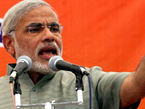
When it comes to Indian elections, the numbers are always mind boggling. India, with more than 820 million eligible voters, is, as the saying goes, by far the world largest democracy. India’s democracy is several hundred million voters larger than all the Western democracies combined.
One hundred million more Indians will vote this year than voted in the last election of 2009. India’s national elections are always a rolling multi-week affair. This year, the polling will take place in nine phases over a period lasting nearly five weeks. Indian voters will cast ballots at more than one million separate polling places. At issue is control of India’s parliament, or Lok Sabha.
Because India is so huge, with so many poor people, connected by such varying degrees of creaky infrastructure, it is not possible to have a national election on the same day. While the first votes were cast last week in India’s remote and desperately poor eastern states of Assam and Tripura, where more than 80 percent of the eligible voters took part, today marks the real start of the marathon affair, with more than 100 million Indians going to the polls across the central Indian states of Kerala, Uttar Pradesh and the capital, Delhi.
At stake are all 543 seats in parliament now controlled by India’s dynastic secular, left-of-centre Congress Party, currently lead by the economist turned politician, Prime Minister Manmohan Singh, who is retiring. India’s democracy is modelled after England’s Westminster system with every constituency, each with an average of roughly 1.7 million voters, electing one single member of parliament.
If all goes according to plan (which they rarely do in India) the results of what will be the biggest election the world has ever seen, will be announced on May 16, 2014; in time for the new parliament to be sworn in before the current one expires on May 31. In addition to being largest in history, at more than $5 billion, India’s election will be far that country’s most expensive and the second most expensive election of all time- next to the 2012 US presidential election which cost an estimated $7 billion.
Exit polls are outlawed during Indian elections so there won’t be any reliable news about the polls until the results are announced.
The stakes this time round are huge. India’s recent rapid growth has slowed, risking the lives and well being of hundreds of millions of newly middle class Indians. Corruption scandals throughout the country involving ruling Congress Party officials have exploded putting Indian voters in a foul mood. A Pew poll released just before voting started April 7, found more than 80 percent of Indians were pessimistic about the country’s economic future. Another way to put it is that Indians want a new start which means firing their current government and hiring a new one.
While the country, surely the most diverse in the world, is ruled at the state and local level by hundreds of separate regional and local parties, at the national level, Indians most fall into one of two blocs. The current ruling coalition is lead by India’s founding Congress Party: a secular, left-leaning party that appears out of ideas and is trying to activate India’s more than 100 million Muslim voters by stoking their fears that the ascendent conservative, free market, Bharatiya Janata Party, (BJP) lead by the charismatic Narendra Modi would spell their doom. It doesn’t appear to be working.
Indians are fed up with stagnation, massive corruption and increasingly byzantine obstacles to economic growth. They appear to blame the ruling party, now lead by Rahul Gandhi – the great grandson of the Congress Party founder and first Prime Minister Jawaharlal Nehru – for much of the mess. More than half of India’s 1.2 billion people are 25 or younger with no memories of living in anything other than a rapidly growing nation. India’s rise has been so extraordinary that very few of those who have benefited from it want anything other than to ensure it continues, which is why the BJP is expected to win a crushing victory at the polls.
Since Modi, the popular three-term governor of India’s prosperous and rapidly growing hi-tech state of Gujarat is socially conservative, pro-Western, pro-free markets, and an unapologetic practicing Hindu, he terrifies most of India’s ruling elites and nearly all Western media. Which is why they so are actively seeking to portray Modi much like they portrayed Ronald Reagan before his 1980 election; as a dangerous, intolerant and trigger happy extremist who threatens to shatter India’s fragile social peace. Britain’s BBC seems to be taking the most extreme anti-Modi position, heavily saturating its election coverage with constant warnings of the manifest dangers presented by a Modi BJP victory.
Britain’s prestigious Economist magazine, while predicting a Modi win in its current edition, accuses him of being a “man associated with sectarian hatred”, and a man about whom there is “nothing, modern, honest or fair.”
The elites have never forgiven Modi for being the recently elected governor of Gujarat state in 2002 when Hindu nationalists went on a devastating rampage that killed more than one thousand Muslims, following the killing of 59 Hindu pilgrims who were massacred when the bus they were traveling on was attacked by Muslims.

COMMENTS
Please let us know if you're having issues with commenting.